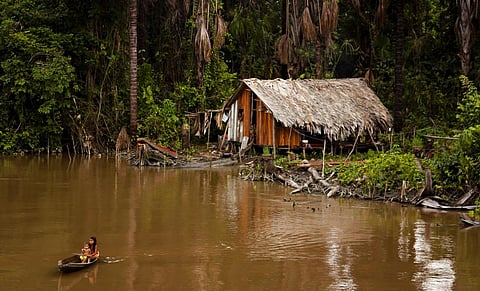

Environmental degradation has an umbilical relationship with human suffering and a group of universities have written a joint note urging the International Criminal Court (ICC) to step in.
The right to a clean, healthy and sustainable environment (R2hE) provides a relevant lens through which “to address the challenges related to the investigation and prosecution of crimes that are committed by means of, or that result in, environmental damage under the Rome Statute”, the universities mentioned March 16, 2024.
Human activities leading to severe environmental harm usually also violated human rights and thus qualifies as a crime such as genocide, crimes against humanity, according to the statement by the Institute of Commonwealth Studies, School of Advanced Study University of London, International Nuremberg Principles Academy, Oxford Sustainable Law Programme, University of Oxford.
The incorporation of R2hE and its associated rights into the legal framework and policies of ICC would be a significant step towards mitigating the environmental crisis and building a more resilient and sustainable future, the paper recommended.
The comments were made in response to an invitation by ICC Prosecutor Karim AA Khan KC, who announced in February 16, 2024 that ICC was developing a new policy paper on environmental crimes. The policy paper would aim to ensure that it takes a systematic approach to dealing with crimes within the court’s jurisdiction committed by means of, or that result in, environmental damage.
Academics, lawyers and campaigners are of the opinion that charges should be levelled against politicians, corporate sector and criminal gangs responsible for acts against the environment. In addition, others who do not do enough to stop these environmental crimes must also be implicated.
Commonwealth Climate and Law Initiative March 11, 2024 published an opinion that analysed the importance of nature-related risks to a director’s duties under the UK law. It mentioned that directors who fail to give consideration to relevant, non-trivial nature-related risks and take appropriate steps to mitigate them may be exposed to claims that they have acted in breach of duty.
The Financial Action Task Force (FATF) 2021 report Money laundering from environmental crime found that criminals are making enormous profits by using front companies to mix legal and illegal goods and payments early in the resource supply chains. They also rely on corruption, trade-based fraud and offshore corporate structures to conceal the ultimate criminals benefitting from these crimes.
The United States has become a destination for money earned through environmental crimes, according to the report by the Financial Accountability and Corporate Transparency (FACT) Coalition published October 26, 2023. This undermines global moves to stem illicit financial flows and combat the climate crisis. The report said that ‘critical gaps’ in the US anti-money laundering system are vulnerable to exploitation by criminal groups, including those behind the destruction of the Amazon.
Closer home, in 2022, a total of 52,920 environmental-related crimes were recorded across the country, in comparison to 64,471 in 2021, according to Crimes in India, 2022 report.